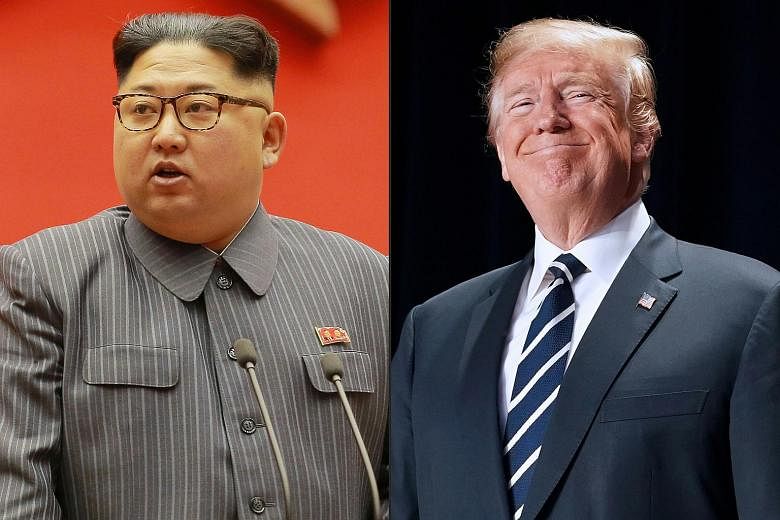SEOUL (THE KOREA HERALD/ASIA NEWS NETWORK) - The announcement of a summit between US President Donald Trump and North Korean leader Kim Jong Un offers hope for peace on the Korean Peninsula.
The summit will follow a meeting in April between President Moon Jae In and Kim. That meeting, which has been overlooked in the mainstream Western media, will offer insight into what to expect from the Trump-Kim meeting to follow. The summits are major victories for Moon, who was instrumental in bring the two leaders together.
Since the announcement, the mainstream media in the US have focused on peripheral issues.
Media outlets critical of Trump have characterised the president's acceptance of Kim's offer as impulsive and have focused on the lack of preparation. Conservative media, by contrast, have focused on North Korea's long history of going back on its word and have suggested that the meeting itself with give Kim unwarranted legitimacy.
The key to understanding the upcoming summits is to think about how the leaders of the three parties involved define results. Each will have to gain something from the meetings for substantive agreements to be reached.
Trump defines results in terms of big wins, which can be used to reinforce his brand as a winner. During his career as a real estate developer, he defined a big win as getting a good deal on a piece of property in a prestigious location like 5th Avenue.
The announcement of the summit itself is a win for Trump because it focuses media attention on him as a "deal maker" and raises hope for the big win of denuclearisation of North Korea.
The importance of denuclearisation for Trump and his brand means that he would not have accepted Kim's invitation without a serious chance that it will lead to denuclearisation. Trump is obsessed with outdoing his predecessors, and verifiable, permanent denuclearisation would do that. I would also put him in contention for a Nobel Peace Prize, which would enhance his brand.
Defining a win for Kim is more difficult. When he took power in 2011, Kim inherited two important things: a weak economy and a nuclear weapons program. To consolidate power, he decided to start market reforms to strengthen the economy while increasing investment in the nuclear weapons and ballistic missile programs.
A comparison of photographs of Pyongyang in 2011 with today shows a changed city. Market reforms have raised living standards for the elite in Pyongyang and continued investment in weapons programs, meanwhile, has kept the military happy.
The rounds of ever-tightening sanctions in 2017 made it increasingly difficult for Kim to achieve economic growth and advance weapons programs.
The weapons programs themselves became more expensive as they developed, which taxed the weakening economy further.
By the end of 2017, Kim faced a choice - either change or wait Trump out. Rather than risk economic collapse while waiting Trump out, Kim chose change and reached out to South Korea before the PyeongChang Olympics.
Now that Kim has decided on change, his main challenge will be to weave it into a narrative that enhances his legitimacy. The upcoming summits allow him to shift the narrative conflict to reconciliation and, by extension, economic development.
To move this process along, he needs face-saving results from his summit partners. Establishing diplomatic relations with the US and Japan soon after would allow him to save face and move forward with denuclearisation. It would open the door to lifting sanctions and opening to trade and tourism.
Defining a win for Moon, meanwhile, is complex. His immediate goal is to remove the threat of war. Denuclearisation and peaceful relations between the US and North Korea would greatly reduce the chance of war. His goal of increased engagement with North Korea, however, is more problematic because the North will want to control the terms and pace of engagement. He may have to settle for limited engagement on the level of what occurred in the early 2000s.
The summits will most likely succeed because all three need and want them to work. The summits will thaw, if not end, the long Cold War on the Korean Peninsula that has existed since 1945.
They will, however, leave a question that Kim will face years from now after Moon and Trump have retired: What is the meaning of a developing capitalist North Korea next to a wealthy and democratic South Korea?
The Korea Herald is a member of The Straits Times media partner Asia News Network, an alliance of 23 news media.

